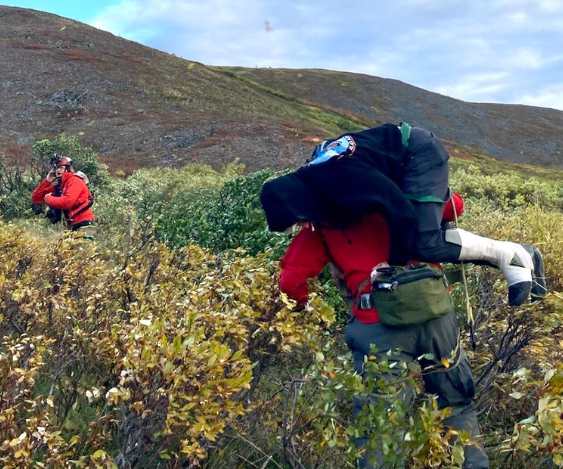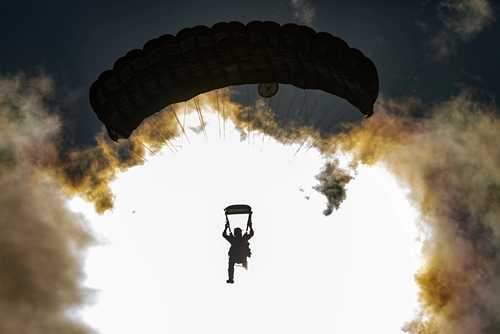CAMP DENALI, Alaska—Guardian Angels from the 212th Rescue Squadron of the Alaska Air National Guard, along with Soldiers from the 1-207th Aviation Regiment of the Alaska Army National Guard, responded to an airplane crash located three nautical miles north of Big Lake, Alaska, Sept. 9.
The 11th Air Force Rescue Coordination Center was notified by the Palmer Police Department at 1:30 p.m. that an airplane had crashed in the area north of Big Lake.
“Typically, the Guardian Angel teams fly on HH-60 Pave Hawk helicopters flown by the 210th Rescue Squadron, but it was down for maintenance,” said Lt. Col. John Morse, the deputy director of the 11th Air Force Rescue Coordination Center, Alaska Air National Guard. “We contacted the Army National Guard, and they responded by sending a UH-60 Black Hawk helicopter.”
The staff of the RCC had heard reports of a signal from a 121.5 ELT beacon in the area and were preparing to respond when they heard from the Palmer Police Department that the passenger from the crash had called them using his cell phone to report the crash, explained Morse.
“The Army Guard helicopter was preparing to go on a training mission, so they were able to respond very quickly,” Morse said. “They flew over to our side of the base and picked up four Guardian Angels and their equipment.”
The Guardian Angel team quickly loaded aboard the Army Guard’s Black Hawk helicopter and departed Joint Base Elmendorf-Richardson, arriving on the scene of the crash at 2 p.m.
“Because it was in a swampy, tundra area, the team had to be inserted about a half mile away from the crash site,” Morse said.
“A team from LifeMed Alaska was already on the scene,” he added. “They had been notified by the Alaska State Troopers and really helped out with the survivor.”
Once on the ground, the Guardian Angel team made their way to the crash site and began treating the critically injured crash victims and prepped the area for the evacuation part of the mission.
“One of our PJs used a chainsaw to cut a bunch of trees and make a landing zone closer to the crash site for the helicopter,” explained Morse.
The two crash victims, Kenneth Whedbee and Jason Scott, both of Big Lake, were transported by the Black Hawk to the Mat-Su Regional Medical Center and released to the medical staff at 2:48 p.m. There, the pilot of the plane, Kenneth Whidbee, was pronounced deceased by the medical staff of the hospital.
The Guardian Angels from the 212th Rescue Squadron and the crew of the UH-60 Black Hawk helicopter from the 1-207th Aviation Regiment were credited with the save of the passenger.
“I really want to stress how much we appreciate the help from the Army Guard,” said Morse. “Though they’re not equipped for our specific mission, they adapted to the situation and played a critical part in saving this man’s life. If they hadn’t been able to help and gotten our guys there so quick, this guy would not have survived. We typically don’t work together, but they made the mission happen. Kudos to the Army Guard, they were right on it.”







